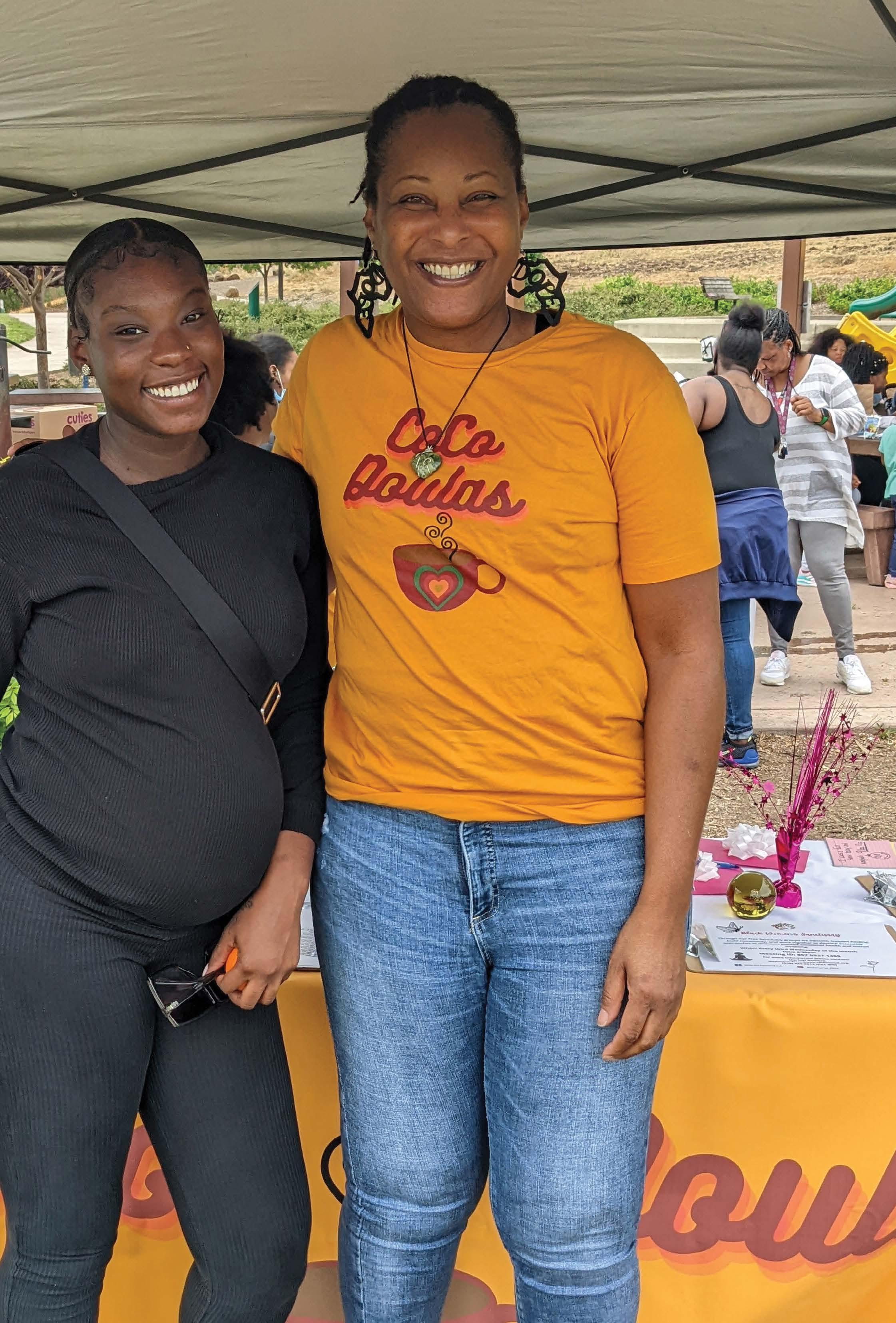
5 minute read
Doulas & Dads Recruited to Improve Black Infant Health
Innovative CoCo Doulas program trains & lifts up Black workforce
Setting up a nursery, choosing clothes, picking a name—these are the joyful landmarks for most expectant parents. But too many Black families face a far different and less uplifting reality.
Advertisement
Black babies in the Bay Area are two to three times more likely to be born too soon or too small or die before their first birthday. And Black mothers are three to four times more likely to have pregnancy complications such as hemorrhaging, cardiovascular complications and even death. What’s going on?
“These outcomes are preventable, and it’s not just by addressing an individual’s behaviors. It’s looking at the cumulative lived experience of Black people. Health inequities are impacting the whole Black family,” says Natalie Berbick, program director for Contra Costa Health’s Family, Maternal & Child Health program. She says these poor perinatal health outcomes are symptoms of structural racism and problems that have persisted for decades, including workplace discrimination, implicit bias in the medical field, lack of affordable housing and limited access to healthcare.
Determined to turn around these tragic trends and address the inequities that cause them, Contra Costa Health is investing in novel and tailored approaches. Through state funding for the Perinatal Equity Initiative, Contra Costa Health partnered with community-based organizations to launch two powerful pilot programs that build support and resiliency for Black families.
CoCo Doulas
Doulas are trained professionals who provide emotional, physical and educational support to people throughout their pregnancy, birth and the postpartum period. Contra Costa Health partnered with Building Blocks for Kids, a Richmond community-based organization, to create a fellowship program called CoCo Doulas that trains, supports and uplifts the Black doula workforce in Contra Costa County.
Lauren McCollins coordinates the program and says that before it started it was difficult to find Black doulas in Contra Costa, “Now we’re coming together, we’re knowing each other. It’s beautiful that we can both serve and connect.”
Passionate about maternal well-being and improving disparities in the Black community, Savaneh Martinez is a West County mother of five who is now a doula thanks to CoCo Doulas. “It’s an honor to be able to prepare, encourage and empower women to enter their sacred birth space as they see fit. Doulas play an integral part in bringing forth a positive experience for mothers, even if things are diverted from the original plan. We help mothers feel well-informed about their decisions and help them be aware of their rights.”
Savaneh says that each stage of the CoCo Doula training helped her feel prepared to serve. “I went from not knowing how attainable being a doula was to now being a doula, a maternal mental health peer support specialist, a lactation peer support specialist and I just obtained my lactation educator certification, with more to come. But it all began with CoCo Doulas.”
Krishonda is an Antioch mother who participated in the program. She says that her doula, Jillian, gave her much-needed support and she still keeps in contact with her today because of the significant role she played in her pregnancy. “Before I was referred, I didn’t have that support that women should have when they’re pregnant. Once I met Jillian, it just turned around for me. I was looking forward to meeting her every week and talking to her. Some people have a job and that’s all it is. But I can tell she is passionate about what she’s doing.”
Partners in Pregnancy Fatherhood Program
In partnership with Aspiranet, a Pittsburg community-based organization, Contra Costa Health’s Partners in Pregnancy Fatherhood Program is also working to strengthen Black families. Facilitated by Fatherhood Engagement Specialist Lonnie Blanson, the program offers a 12-session course for fathers expecting a child or parenting an infant with a Black mother. Primarily run in group settings, the Fatherhood Program has become a protected safe space for fathers to openly discuss and reflect upon everything from their own experience being parented, stressors in their lives, strategies for how to support their child’s mother and how they want to be as a parent of a Black child.
Unlike many similar programs, the majority of fathers who start the program finish it. And Lonnie says that the growth these participants go through is clear to see. “After completing the program, they’re more knowledgeable about how they can support their partner and they have a better idea of the type of father they want to be, and how they can become that person.”
Lonnie explains that many fathers may not know just how much racism and discrimination impacts the mother of their child. The program helps them understand these challenges and makes them want to become more involved with their partner and their child. “They start going to doctors appointments together and they know what types of questions they should ask and what discussions they should have so they can become the best possible parents for their child,” explains Lonnie.
Michael is a first-time father who participated in the program. He says that the program helped him on his fatherhood journey. “As a first-time father who didn’t have a father growing up, it was really good for me to hear the experiences not only of other men who already had children but also others who grew up with their father and some of the things they learned and applied. I was appreciative of that and I think it’s helped make me a better first-time father.”

